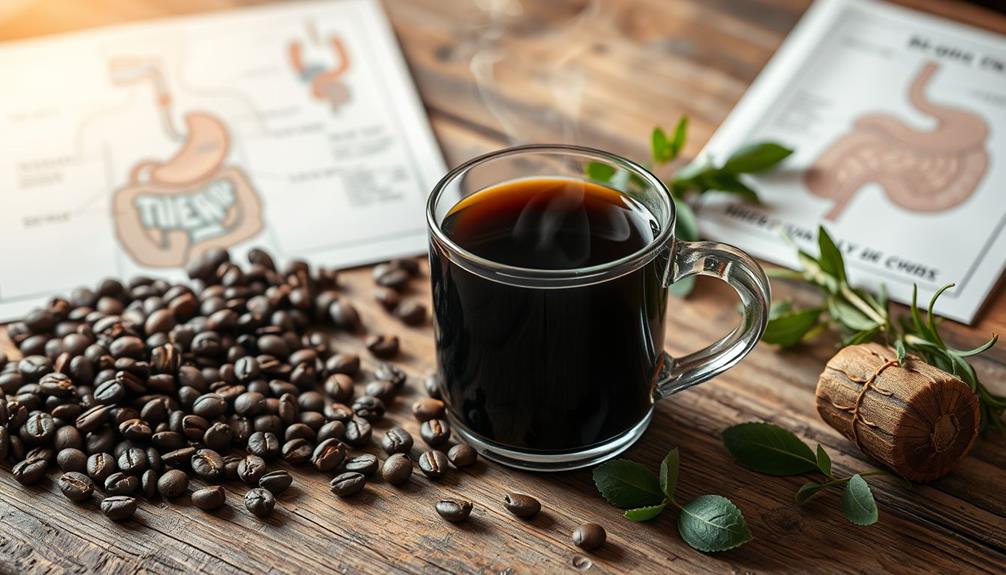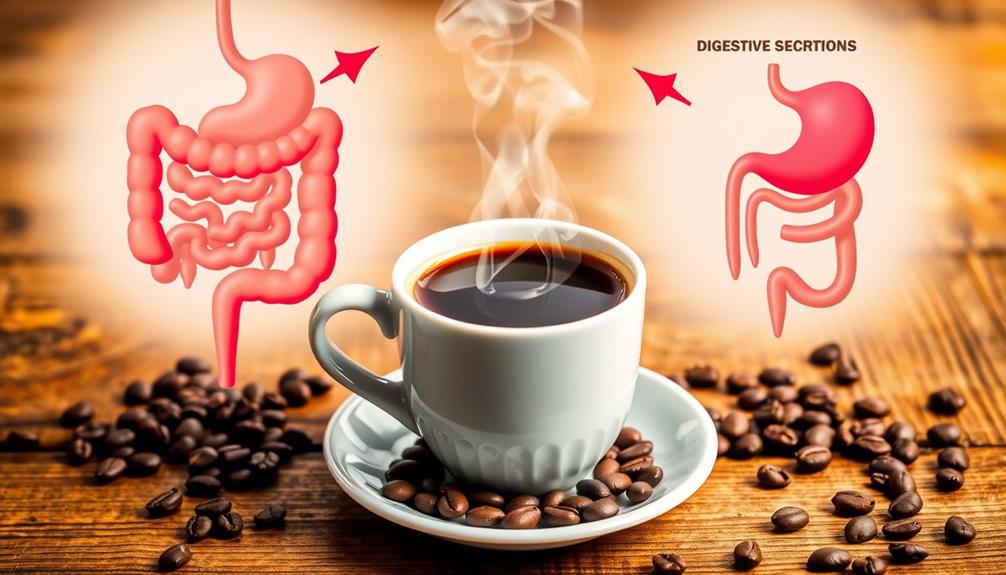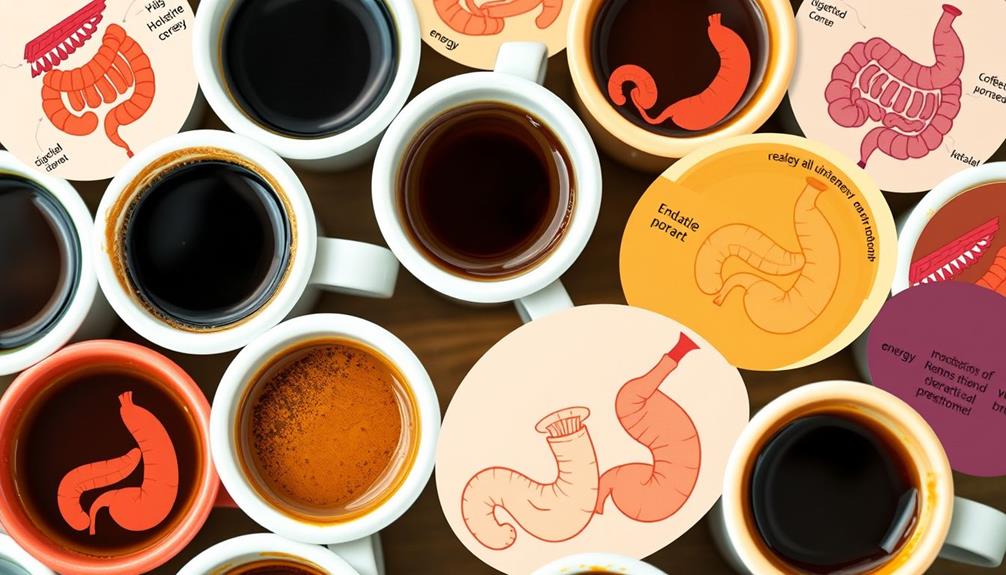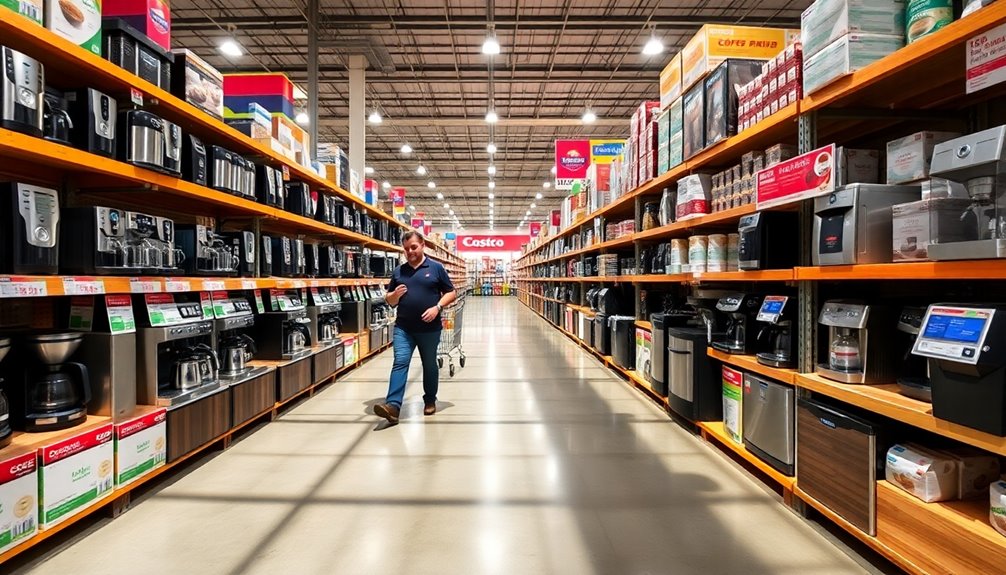Coffee plays a notable role in your digestive health. When consumed in moderation, it can stimulate your gastrointestinal system, enhance gastric acid production, and promote beneficial gut bacteria, which supports overall gut health. However, reactions can vary; while some may find coffee helps relieve constipation, others with conditions like IBS or GERD might experience increased discomfort. Dark roast coffees, being less acidic, may be easier on your stomach. Balancing your coffee intake with hydration is key, and monitoring how your body responds is important. There’s much more to uncover about coffee’s impact, so keep exploring those details!
Key Takeaways
- Moderate coffee consumption (1-3 cups/day) supports digestive health by promoting colon motility and increasing beneficial gut bacteria.
- Coffee stimulates gastric acid production, enhancing digestion, but individual responses may vary based on specific digestive conditions.
- Dark roast coffees are generally less acidic, making them easier on the stomach than lighter roasts.
- Some individuals with IBS, GERD, and IBD may experience negative effects from coffee, necessitating personal adjustments to intake.
- Regular coffee intake can contribute positively to fluid intake, although pairing it with water helps mitigate dehydration effects.
Overview of Coffee and Digestion

Coffee plays a considerable role in digestion, acting as a natural stimulant for your gastrointestinal system. When you enjoy coffee, it stimulates gastric secretion of hydrochloric acid and gastrin, which helps break down food and enhances digestive processes. This means that moderate coffee consumption, generally defined as up to 3-5 cups per day, can support your digestive health without harmful effects on your digestive organs.
Furthermore, different brewing methods can lead to varying caffeine levels in coffee and tea, which may further influence digestive reactions in some individuals various brewing methods.
Interestingly, coffee also promotes colon motility, potentially alleviating constipation. However, the impact of coffee on digestion can vary depending on the type of coffee you choose, its origin, roasting, and preparation methods. For instance, dark roast coffees tend to be less acidic than lighter roasts, which might suit your stomach better.
Additionally, coffee consumption influences gut microbiota composition, particularly increasing levels of beneficial Bifidobacteria, associated with improved gastrointestinal health. While coffee can stimulate intestinal movement, leading to loose stools or diarrhea in some individuals, its overall effects on digestion can differ markedly from person to person.
Effects on Gastrointestinal Secretions

The stimulating effects of coffee on gastrointestinal secretions play an important role in how your body processes food. When you drink coffee, it boosts the production of gastric hydrochloric acid and the hormone gastrin, both essential for efficient food breakdown in the stomach. This means that coffee can enhance your digestive system‘s ability to handle what you eat.
Additionally, it’s important to take into account how various foods and beverages, including coffee, can interact with medications, as some cold medications may have side effects that could affect digestion.
Caffeine and polyphenols found in coffee are particularly effective in promoting gastric acid secretion. If you prefer caffeinated coffee, you’ll likely experience stronger effects than with decaffeinated options. Notably, cold instant coffee and cold espresso have been shown to yield the highest increases in salivary alpha-amylase, an enzyme critical for digesting polysaccharides.
However, be mindful that dark roasted coffee might reduce gastric acid secretion due to higher levels of N-methylpyridinium, which inhibits stomach acid production.
Despite these stimulating properties, coffee doesn’t greatly affect the rate of gastric emptying, indicating a complex relationship between coffee consumption and digestive processes. So, while coffee can aid in digestion through its effects on gastrointestinal secretions, its overall impact is nuanced and varies depending on the type you choose.
Coffee and Digestive Disorders

When it comes to digestive disorders, coffee’s effects can vary widely from person to person.
Some studies suggest that coffee can stimulate gastric acid secretion, which may benefit those with sluggish digestion, while others may find it aggravates their symptoms.
If you have conditions like IBS, GERD, or IBD, you might notice how coffee either triggers your symptoms or brings some relief.
Understanding these impacts can help you make informed choices about your coffee consumption, particularly when considering the unique flavor profiles of different coffee varieties.
Coffee and IBS Symptoms
For many individuals dealing with Irritable Bowel Syndrome (IBS), coffee can stir up a range of uncomfortable symptoms. While some may enjoy their morning brew, it’s important to understand how coffee consumption affects your gastrointestinal tract.
The stimulant effects of caffeine can lead to increased intestinal movement, which might trigger episodes of diarrhea or urgency. Many IBS sufferers report heightened abdominal pain and irregular bowel movements after drinking coffee, primarily due to its acidity and potential to irritate the gastrointestinal lining.
Additionally, certain essential oils, such as peppermint oil, may help alleviate digestive discomfort that can accompany IBS.
Here are some key points to take into account:
- Coffee may exacerbate IBS symptoms for many individuals.
- Caffeine can lead to increased urgency and diarrhea.
- The acidity of coffee might irritate an already sensitive gastrointestinal tract.
- While some find coffee helps relieve constipation, effects vary widely.
- A personalized approach to coffee consumption is essential.
Ultimately, if you’re managing IBS, it’s vital to monitor your reactions to coffee and consult with a healthcare provider to determine what works best for you. Understanding your body’s responses can help you manage your IBS symptoms more effectively.
Effects on GERD Patients
Coffee can pose significant challenges for those with gastroesophageal reflux disease (GERD), as its effects on the digestive system can vary widely among individuals.
While some studies indicate no significant association between coffee consumption and GERD symptoms, many patients report experiencing negative effects. For instance, coffee has been shown to increase gastric acid secretion, which can worsen heartburn and reflux symptoms for sensitive individuals.
Additionally, consulting with a financial advisor before making decisions on dietary changes can help in managing overall health, just as it does in financial investments.
Research highlights that a notable percentage of GERD patients associate their coffee intake with heightened symptoms. This variability underscores the importance of personalized dietary management.
You might find that while 20% of ulcerative colitis patients report adverse reactions to coffee, others with GERD might experience significant discomfort.
It’s essential to pay attention to your body’s responses. If you notice that coffee exacerbates your symptoms, consider reducing your intake or switching to low-acid alternatives.
Coffee’s Role in IBD
Many individuals with inflammatory bowel disease (IBD) find themselves maneuvering the complex relationship between coffee consumption and their digestive health. A 2015 study revealed that 73% of IBD patients drink coffee regularly, but reactions can differ widely. For instance, 45% of Crohn’s disease patients reported negative effects, while only 20% of those with ulcerative colitis experienced adverse reactions.
It’s crucial to evaluate how financial health can also play a role in managing health conditions, including potential treatments or dietary adjustments creating a personal budget for better overall well-being.
Coffee can exacerbate symptoms in gastrointestinal disorders, particularly for those with irritable bowel syndrome (IBS) and gastroesophageal reflux disease (GERD). Additionally, coffee alters gut microbiota composition, potentially impacting symptoms in IBD.
However, it’s not all bad news—moderate coffee consumption might offer some benefits, such as constipation relief, which many IBD patients appreciate.
Here are some key takeaways about coffee’s role in IBD:
- Monitor your body’s response to coffee consumption.
- Different IBD subtypes may react differently to coffee.
- Evaluate your overall gastrointestinal health.
- Moderate coffee might help with constipation relief.
- Talk to a healthcare provider if you experience negative effects.
Understanding these nuances can help you make informed choices about coffee in your daily routine.
Benefits of Moderate Coffee Consumption

Moderate coffee consumption offers a range of benefits for digestive health that might surprise you. When you enjoy 1-3 cups a day, you’re not just savoring a delicious beverage; you’re also stimulating your digestive processes.
Coffee enhances gastric acid production, which can improve overall digestion and help break down food more effectively. Notably, just like celery juice that promotes hydration, coffee can also act as a natural diuretic, aiding in overall digestive function.
Moreover, coffee increases the secretion of cholecystokinin (CCK), promoting bile production that aids in fat digestion. This can be particularly beneficial for those looking to manage their weight or improve their digestive efficiency.
Research shows that coffee can even improve colon motility, potentially alleviating chronic constipation more effectively than water.
Another impressive benefit is its positive impact on gut microbiota. Studies indicate that coffee consumption may boost levels of beneficial bacteria, like Bifidobacteria, which play a significant role in maintaining gut health.
Additionally, the anti-inflammatory properties of coffee may offer protective effects against certain gastrointestinal diseases, including gallstones and liver conditions.
Coffee Types and Acidity Levels

When selecting your morning brew, understanding coffee types and their acidity levels can greatly affect your digestive comfort. If you’re prone to digestive discomfort, opting for a dark roast might be your best bet.
Dark roasts generally have lower acidity levels compared to lighter roasts, making them easier on the stomach. Additionally, certain brewing methods can enhance flavor while potentially reducing acidity, which is something to take into account when preparing your coffee.
The higher levels of N-methylpyridinium found in dark roasts may even inhibit gastric acid production, reducing acid-related symptoms. If you’re also concerned about indoor air quality while enjoying your coffee, maintaining a clean environment with proper air purifiers can further enhance your overall comfort air purifier maintenance dos and don’ts.
Here are some tips to take into account:
- Choose dark roast coffee for lower acidity.
- Avoid lighter roasts if you experience GERD or stomach irritation.
- Monitor your body’s response to different coffee types.
- Limit caffeine intake, as it can stimulate gastric acid production.
- Experiment with brewing methods to find what suits you best.
Individual Responses to Coffee

When you drink coffee, your body might react in ways that are completely different from someone else’s. Some folks find that it kickstarts their digestion right away, while others might wait hours for any effect.
This variability can be influenced by factors such as individual metabolism and overall health, which means some may experience digestive benefits while others face discomfort or irregularity.
The timing and frequency of your coffee consumption can greatly shape how your digestive system responds, particularly when combined with habits like gentle stretching before bedtime that promote overall well-being.
Varying Digestive Reactions
Coffee affects everyone differently, and your body’s response can range from quick trips to the bathroom to no noticeable effects for hours. The varying digestive reactions stem from individual responses to coffee consumption, particularly how it impacts the digestive tract.
For some, a cup can stimulate bowel movements, which is often beneficial for those prone to constipation. Conversely, around 45% of Crohn’s disease patients report negative effects from coffee, indicating that those with digestive disorders may experience discomfort or exacerbation of their symptoms.
Additionally, understanding the emotional and psychological aspects of managing digestive health is important, especially for seniors who might be dealing with multiple health issues emotional support for caregivers.
Excessive coffee intake can lead to unwanted gastric issues, jitters, and flare-ups of conditions like irritable bowel syndrome (IBS). It’s essential to recognize how your body reacts, as timing can also play a role in these effects.
- Monitor how coffee affects your bowel movements.
- Pay attention if you experience gas or bloating.
- Consider reducing intake if you have IBS or overactive bladder.
- Experiment with timing to align with natural digestive processes.
- Keep track of your overall digestive health in relation to coffee consumption.
Understanding these individual responses can help you make informed choices about your coffee habits.
Timing and Frequency Effects
Understanding how timing and frequency affect your response to coffee can help you optimize its benefits for digestive health.
The timing of your coffee intake is important; consuming it in the morning can stimulate the gastrocolic reflex, promoting colon contractions and enhancing digestive processes. This can lead to quicker bowel movements for some individuals, while others may experience delayed effects hours later.
Frequency also plays a significant role. Regular coffee consumption can increase bowel motility, making it particularly beneficial for those prone to constipation. In fact, coffee tends to be more effective than decaffeinated options or even water in this regard.
However, it’s important to be mindful of how much coffee you consume. Excessive intake may lead to jitters or worsen digestive conditions like irritable bowel syndrome or overactive bladder.
To find your sweet spot, monitor your personal tolerance levels. If you have any digestive sensitivities, adjusting your coffee intake frequency is crucial to prevent discomfort.
Hydration and Coffee Consumption

Often overlooked, hydration plays an essential role in how coffee affects your body. While coffee is a mild diuretic, which can increase urine production, moderate coffee consumption (1-3 cups daily) doesn’t greatly dehydrate you.
In fact, it can contribute positively to your daily fluid intake. However, individual responses to coffee can vary, meaning some people might feel dehydrated while others experience minimal effects.
To maintain ideal hydration and digestive function, consider the following tips:
- Drink a glass of water alongside your coffee.
- Monitor your personal tolerance to coffee and adjust your consumption accordingly.
- Stay mindful of how your body reacts after drinking coffee.
- Balance your coffee intake with other hydrating beverages.
- Remember that hydration is vital for overall health.
Coffee’s Role in Gut Microbiome

When you enjoy your cup of coffee, you’re not just savoring a rich flavor; you’re also influencing your gut microbiota.
Studies show that coffee can boost levels of beneficial Bifidobacteria, which are essential for gut health, while its anti-inflammatory effects may further enhance your digestive environment.
Understanding how these changes impact your overall health can provide valuable insights into the role coffee plays in your daily routine. For example, excessive coffee consumption can lead to increased anxiety and disrupted sleep patterns, impacting mental health. On the other hand, moderate coffee consumption has been shown to improve mood and cognitive function. Understanding the balance between coffee consumption and mental health can help individuals make informed decisions about their daily coffee intake and its overall impact on their well-being.
Microbiota Composition Changes
Coffee’s impact on gut microbiota composition is significant, as it has been shown to increase levels of beneficial bacteria like Bifidobacteria. This shift in your gut microbiota can foster a healthier gastrointestinal environment, promoting better digestion and reducing potential complaints.
Notably, studies suggest that these changes mainly occur at the population level, indicating that coffee consumption has a broad impact on gut health rather than affecting individual species.
Here are some key points to reflect on:
- Moderate coffee intake is linked to a reduced risk of constipation.
- The presence of beneficial bacteria can enhance nutrient absorption.
- Coffee components may interact with gut microbiota to promote a healthier gut.
- Improved gut motility due to coffee consumption can aid digestion.
- Ongoing research is necessary to fully understand the long-term effects on digestive health.
As you enjoy your daily cup, remember that your choice of coffee may influence the diversity and balance of your gut microbiota, leading to potential benefits for your overall gastrointestinal health.
Embracing coffee as part of your routine might just support your digestive journey!
Beneficial Bifidobacteria Influence
The rise in beneficial Bifidobacteria due to coffee consumption highlights its role in promoting gut health. Research shows that regular coffee intake can markedly alter your gut microbiota composition, particularly by increasing levels of Bifidobacteria. These beneficial bacteria are essential for maintaining gastrointestinal health, and higher Bifidobacteria levels are linked to improved digestion and reduced symptoms of gastrointestinal disorders.
The positive effects of coffee on Bifidobacteria are especially marked at a population level, suggesting that moderate coffee consumption can help create a healthier gut environment. One of the key players in this relationship is coffee’s rich content of polyphenolic compounds, which may support the growth and activity of Bifidobacteria.
This enhancement in gut microbiome diversity is vital for overall digestive health. As you enjoy your daily cup of coffee, remember that it’s not just a delightful beverage; it’s also a potential ally for your gut.
Continued exploration of coffee’s influence on gut microbiota will deepen our understanding of its implications for digestive health and possible therapeutic benefits, making your coffee habit even more rewarding.
Coffee’s Anti-inflammatory Effects
Harnessing the power of coffee can bring significant anti-inflammatory benefits to your gut microbiome. Research shows that coffee consumption alters gut microbiota composition, increasing beneficial bacteria like Bifidobacteria, which are essential for digestive health. The bioactive compounds in coffee, particularly chlorogenic acids, contribute to its anti-inflammatory effects, promoting a healthier gut environment.
Here are a few key points to take into account:
- Moderate coffee intake enhances gut microbiome diversity, reducing the risk of gastrointestinal disorders.
- Certain compounds in coffee may help diminish gut inflammation, offering protective effects against conditions like inflammatory bowel disease (IBD).
- The anti-inflammatory effects of coffee can positively influence the gut-brain axis, impacting overall wellness.
- Increased levels of beneficial bacteria improve nutrient absorption and digestion.
- Regular coffee consumption can lead to a more resilient gut microbiota composition.
Incorporating coffee into your diet can be a delicious way to support your digestive health. By enjoying a moderate amount of this beloved beverage, you can harness its protective effects and promote a balanced gut environment, ultimately enhancing your overall well-being.
Alternative Beverages for Digestion

Many people are turning to alternative beverages to support their digestive health. If you’re looking for options, herbal teas like peppermint or ginger can be incredibly soothing. They’ve been known to reduce bloating and promote gut motility, making them excellent choices for digestion.
If you’re sensitive to caffeine but still want some coffee benefits, decaffeinated coffee provides a milder option while still delivering polyphenols and antioxidants.
You might also consider bone broth, which is rich in collagen and amino acids that support gut health. It can potentially heal the gut lining and improve nutrient absorption.
If you’re after a caffeine-free alternative, chicory root coffee is a great pick. It contains inulin, a prebiotic fiber that promotes healthy gut bacteria and enhances digestion.
Probiotic beverages like kefir or kombucha are also worth exploring. They can help balance your gut microbiome and aid digestion thanks to their beneficial bacteria content.
Recommendations for Coffee Drinkers

For coffee drinkers looking to enjoy their favorite beverage without compromising digestive health, moderation is key. Aim for moderate coffee consumption, defined as 1-3 cups per day. This amount is generally safe for most and may even aid digestion by stimulating gastric hormone production and improving colon motility.
However, it’s essential to monitor your individual tolerance levels, especially if you experience digestive issues like heartburn or diarrhea.
Here are some recommendations to keep in mind:
- Choose dark roast coffees, as they’re less acidic and may reduce discomfort.
- Stay hydrated by drinking water alongside your coffee to counteract caffeine’s diuretic effects.
- Experiment with herbal teas or decaffeinated coffee if regular coffee causes adverse effects.
- Limit your coffee intake if you have conditions like GERD or IBS to avoid exacerbating symptoms.
- Pay attention to how your body reacts and adjust your coffee habits accordingly.
Frequently Asked Questions
What Does Science Say About Drinking Coffee?
Science shows that drinking coffee can boost your energy and alertness. It stimulates gastric acid production, aids digestion, and may even positively affect gut health, but moderation is key to enjoying its benefits without discomfort.
How Does Coffee Affect the Digestive System?
Coffee affects your digestive system by stimulating gastric acid production and enhancing food breakdown. It can improve colonic motility, providing relief from constipation, while moderate consumption typically supports gut health without significant irritation.
What Does Coffee Do to Your Gut Health?
Coffee can boost your gut health by increasing gastric acid production and promoting beneficial gut bacteria. It also helps with digestion and may relieve constipation, though individual responses can vary markedly based on personal tolerance.
What Is the Theory About the Effects of Coffee?
Imagine coffee as a vibrant conductor, orchestrating your digestive symphony. The theory suggests its stimulating effects enhance gastric functions and gut flora, promoting digestion while potentially providing protective benefits, though it can stir discomfort for some.
Conclusion
In short, coffee can have both positive and negative effects on your digestive health, depending on how much and what type you consume. While it may stimulate gastrointestinal secretions and support gut health in moderation, it can also exacerbate certain digestive disorders for some. So, when it comes to your morning cup, you need to know what works for you. Remember, it’s all about finding the right balance to keep your gut feeling its best!










